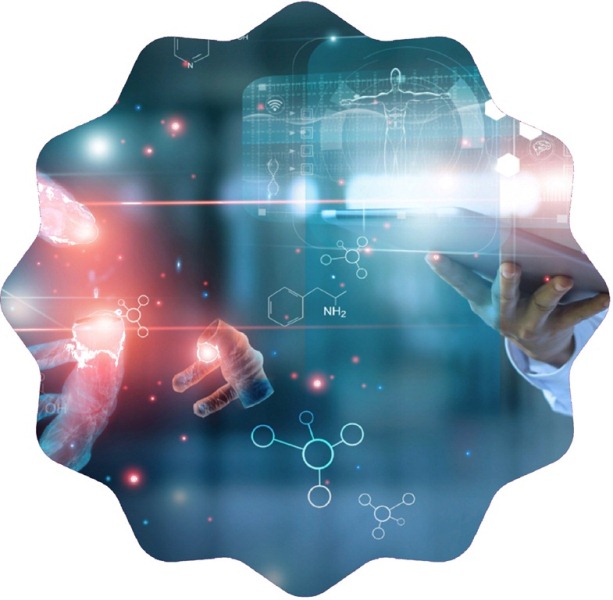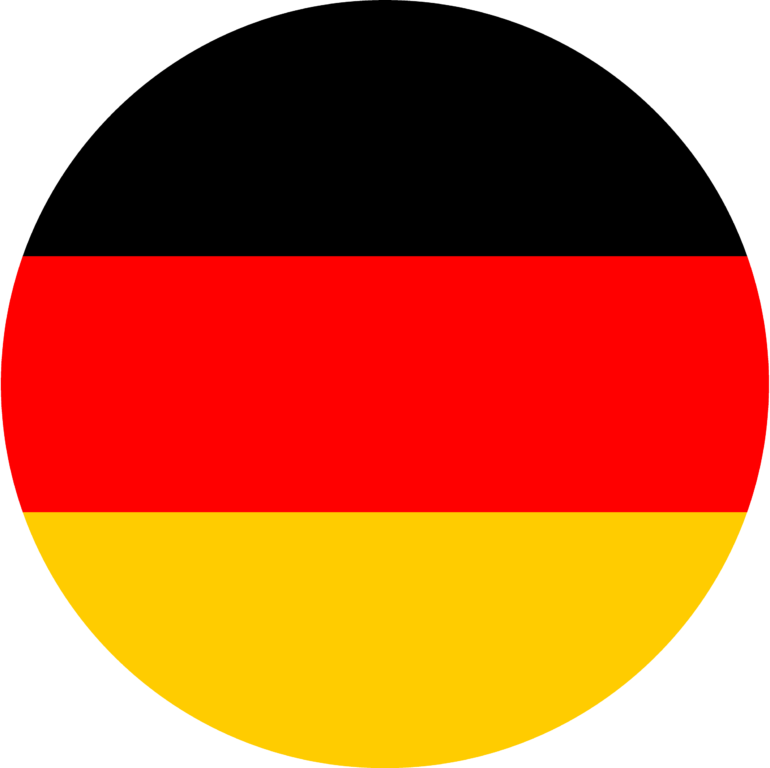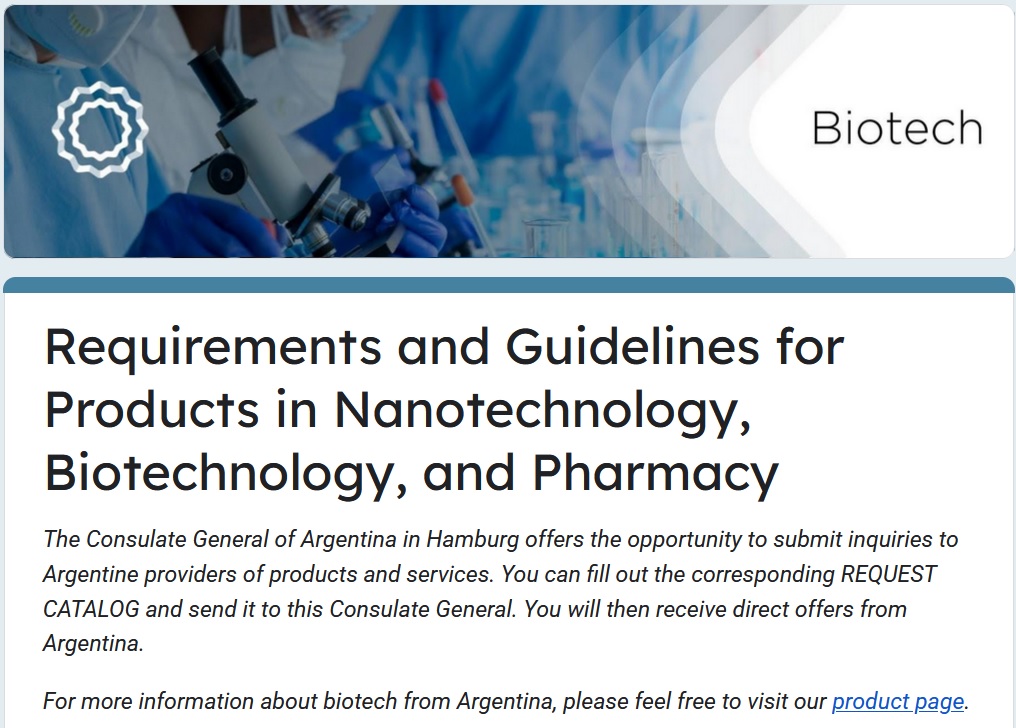
FOR HEALTH & SUSTAINABILITY ►
Argentina has established itself as a leading center for biotechnology, supported by a highly qualified bioscience community, a thriving pharmaceutical, food, and beverage industry, and increased efforts in research and development in both the public and private sectors. This places the country in an outstanding position to benefit from global opportunities in the biotech sector.

Multinational players such as Bayer CropScience, Dow AgroSciences, Nidera, and Pioneer have chosen Argentina as a location for their research and development activities, thereby strengthening the local biotech sector and creating growth opportunities. Additionally, Argentina has produced innovative companies like Bioceres, Biocientífica, Biogénesis-Bagó, BioSidus, Cassará, and Indear, which have achieved significant international success.
In the past 15 years, Argentina's biotechnology sector has experienced exponential growth, with the number of companies nearly tripling from 120 in 2008 to 340 in 2023. This significant increase positions Argentina among the top 20 nations with a remarkable critical mass of biotech companies, comparable to established biotech hubs like Belgium, Norway, and Portugal.
The sector generates USD 3,752 million exclusively from biotechnological products and employs 27,000 people. Investments in research and development exceed USD 91.4 million, with 7% allocated to the healthcare sector. The dynamic local business ecosystem records annual investments of around USD 1.1 billion.

The sector's annual exports reach USD 430 million, representing almost 20% of revenue, a share that has risen to 45% in the human health sector. The main targets for Argentine biotech exports are Brazil, the United States, Uruguay, Paraguay, China, the Netherlands, Bolivia, Colombia, and Chile.
Biotech startups play a central role in Argentina: in 2022, companies founded in the last seven years already accounted for 43% of the country's biotechnology firms. 56% of biotech companies have been established in the last 15 years. These companies are characterized by their high level of innovation. They develop cutting-edge technologies, which they secure through industrial protection rights, and pursue rapidly growing business models on a global scale. Besides the USA, Argentina is the leading provider of projects for IndieBio, the world's first accelerator for biotech startups.
Innovations in Bio-Pharma
A long tradition in medical and bioscience research, dating back to the 19th century, has enabled the development of an advanced pharmaceutical industry. Argentine pharmaceutical companies meet the strictest international standards in processes and production performances and are distinguished by their ability to develop new products at every stage of the innovation process – from conception through clinical development to marketing and the global export of high-quality pharmaceuticals.
Argentina's pharmaceutical industry works closely with local and multinational companies as well as public research institutions, making significant advances in animal health and nutrition, among other areas.

Notable achievements include the production of animal vaccines, highlighting expertise and reputation in producing vaccines for salmon farming and preventing diarrheal diseases in newborn calves caused by bovine rotavirus and foot-and-mouth disease.
Argentina has achieved most of its biotechnological advances through the application of recombinant DNA technology. The country belongs to an exclusive group of nations that master advanced pharmaceutical dairy technologies, including the USA, Australia, South Korea, and New Zealand. Argentina also has the capability to clone and develop transgenic animals, a technology mastered by only a few countries worldwide.
The pharmaceutical sector in Argentina shows significant growth potential in the short and medium term. The COVID-19 pandemic and its aftermath have highlighted the importance of strengthening healthcare systems in developing countries. As a result, the demand for medical products has increased significantly. At the same time, many countries are striving for self-sufficiency in food production, leading to a greater demand for veterinary pharmaceutical products.
Products with high potential come from the animal protein sector, which, thanks to Argentina's grain surpluses, offers the possibility of increasing livestock production and meeting the growing local demand.
Argentina is currently investing in a variety of projects that address climate change and improve healthcare accessibility. These initiatives focus on ecological and social challenges as well as promoting sustainable development.

A selection from the Biotech range
Human Health:
- Molecular diagnostic kits (qPCR) for human diseases;
- Immunological products (dosed or for individual sale): diagnostic reagents, monoclonal antibodies, antisera (serums with antibodies), and other blood fractions;
- ELISA diagnostic kits for human brucellosis, Chagas disease, and E. Coli STEC
- Immunochromatographic test strips for rapid diagnosis of brucellosis and E. Coli STEC;
- Enzymes for diagnostic kits, precision medicine, clinical genomics, oncology, human microbiome, and reproductive genomics;
- Recombinant human erythropoietin bioprotein (rhEPO);
- Monoclonal antibodies and other biological products;
- Management and development services for protocols in clinical research (CRO);
- Vaccines.
Animal Health:
- ELISA diagnostic kits for bovine, ovine, caprine, and porcine brucellosis;
- ELISA diagnostic kits for canine brucellosis;
- Immunochromatographic test strips for the rapid diagnosis of canine brucellosis
- Veterinary drugs;
- Bioprocessing organic materials into sustainable products for animal feed;
- Products for the prevention and treatment of bacterial infections in the poultry, swine, and cattle industries;
- Vaccines and viral antigens for veterinary medicine.
Food and Dietary Supplements:
- Systems for stabilizing bioactive compounds of plant origin;
- Development and production of industrial enzymes;
- Dietary supplements (drinkable);
- Bovine and swine plasma, bovine and swine hemoglobin in powder form;
- Vitamins, provitamins, tocopherols, and phytosterols;
- Dairy and meat ferments;
- Liposomal ingredients for cosmetic products for topical use (gels, emulsions, and creams);
- Liposomal deliveries for drinkable nutraceuticals.
Agriculture:
- Consortium of microorganisms for all types of plants;
- Other culture media for the development of microorganisms;
- Biological products, fertilizers, seed genetics;
- RNA technologies for smart plants;
- Development of herbicide-resistant plants.
Cosmetics and other applications:
- Fungus-based bio-leather;
- Services for analyzing the identity and safety of microbial strains;
- Microbial bioinoculants for the treatment of liquid wastewater streams;
- Biotechnological solutions for bioenergy and environmental impacts;
- LT8- High-performance disinfectant cleaner for use on surfaces and equipment;
- Nanotechnological particles, functionalized with copper and silver;
- Biodegradable gel for use in underground cables and thread guides;
- Bacterial nanocellulose as an additive for paper, paint, cosmetics, medical, and food industries.
For more information:  www.cabiotec.com.ar/
www.cabiotec.com.ar/
CAB, the Cámara Argentina de Biotecnología, aims to strengthen Argentina's leadership in biotechnology at both regional and international levels by promoting collaboration among stakeholders from various sectors. The goal is to create a productive and innovative environment for biotechnology companies, spanning from research and production to marketing and exporting high-quality products.
DOWNLOADS
Via Google forms: forms.gle/3GE7DgypqAq1hxbf6
The Consulate General of Argentina in Hamburg offers the opportunity to request information from Argentine suppliers of biotech products and services. You can fill out the corresponding REQUEST CATALOG and send it by email to this consulate.





